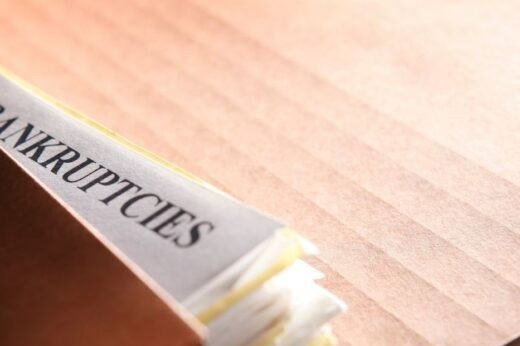
Tips To Consider If You Are Thinking About Filing For Bankruptcy
Bankruptcy is a huge financial decision that should be thoroughly thought about. Learn everything you can beforehand.
If this is happening to you, you need to familiarize yourself with regional bankruptcy laws. Different states use different laws regarding bankruptcy. For instance, some states protect you from losing your home in a bankruptcy, but not in others. You should be familiar with the laws before ffinanceiling.
Don't avoid telling your attorney of any specific details of your case. Don't assume that he'll remember something important later without having a month ago; tell him again. This is your bankruptcy and your future, so do not be afraid to remind your lawyer of any key facts.
Be certain that you can differentiate between Chapter 7 and Chapter 13 differ. Chapter 7 eliminates all outstanding debts. Any ties you have with creditors will definitely be dissolved. Chapter 13 bankruptcy allows for a payment plan that takes 60 months to work with until the debts go away.
Filing for bankruptcy does not necessarily mean that you will lose your house. You might be able to keep your home, contingent on certain factors, if you have two mortgages or if your home has lost its value. You are still going to want to check into homestead exemption because it may allow you to keep your home.
Before filing for bankruptcy consider every available avenue. It might be possible to consolidate some of your debts. It can be quite stressful to undergo the lengthy process to file for bankruptcy. It will also harm your ability to secure credit rating that you have in the future. This is why you explore your other debt relief options first.
It is possible to obtain new vehicle and home loans while a Chapter 13 bankruptcy. You need to contact your trustee so you can get approved for any new loan. You need to make a budget and prove that you will be able to afford your new loan payments. You will also need to be prepared to answer questions about your need for the item.
Consider all of your options before deciding to file for personal bankruptcy. You may want to look into the possibility of credit counseling. You can get the help you need from non-profit companies. They can speak with your creditors to get your payments and your interest reduced. You can even pay your creditors.
Be careful on how you pay your debts before you file for bankruptcy. You may find that bankruptcy law prohibits you from paying back some types of creditors for 90 days before you file, or your family members a year ago. Know the laws prior to deciding what you jump in feet first.
Don't stress about filbusinessing for bankruptcy is something you must do. It might seem a little scary, but as you wait, you accrue more debt.
Juspersonal bankruptcyt because you have filed for bankruptcy it does not necessarily mean you are going to have to give up everything you own. You will be able to keep some personal property.You can keep your clothes, your furniture, clothes and electronics. This will all depend on the type of bankruptcy you choose, the type of bankruptcy you file for, and your state's laws, but you may be able to retain large assets like your home and car.
Make wise decisions when you select a lawyer. This type of law is popular among inexperienced newcomers. Be sure your lawyer has years of experience and is board certified. The Internet could be a great help in checking the disciplinary record of a particular lawyer, as well as client ratings and background information.
Many people who divorce must immediately file bankruptcy because they cannot deal with their financial difficulties. It is never foolish to think twice about divorcing.
Even if your situation seems bleak, it's important that you be completely honest when discussing it with your lawyer.Lying about your obligations and assets and debts is something you really should not do at all. You could go to prison for lying about this information.
Some lawyers have a free phone line so creditors can call instead of you. This should keep the collector from harassing you in the future.
If you file a Chapter 7 bankruptcy only to find that you are not qualified to use the homestead exemption, find out if you can file a Chapter 13 bankruptcy with your mortgage. Some cases make it best for you to take your Chapter 7 case to a Chapter 13 one, dependent on what your attorney says.
Check all of your debt to find out if it will clear the bankruptcy and avoid unnecessary filing. Debts like student loans always remain on your financial history regardless. You may want to consider consulting a loan consolidation or credit repair agency instead of filing for bankruptcy.
Make sure that the lawyer you hire is an experienced bankruptcy lawyer. There are a long list of personal bankruptcy attorney for you to choose from.
Even if you have a lawyer to do that work for you, so you better stay on top of it. Remember that you are not the attorney's only client, so keeping your details straight from others is 100% unlikely. This means that every bit of paperwork the lawyer submits and correct any errors you find immediately.
Chapter 7 filings do not necessarily erase all of the money you owe. For instance, child support debts, child support or court-ordered fines using Chapter 7 bankruptcy.
While laws are different in every state, it is extremely difficult to have student loan debt discharged. You have to prove undue or extreme hardship to get student loans discharged.
This obviously includes information on your credit card debts, medical bills, hospitals, personal debts and so forth.
Filing for personal bankruptcy is a decision you need to make after doing some research. Many steps have to be taken, and all of them must be performed properly. By taking what you have learned here and applying it, the process of bankruptcy will be much smoother.














